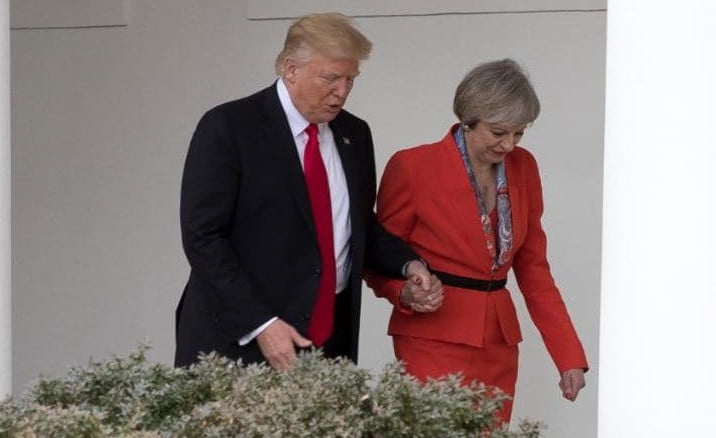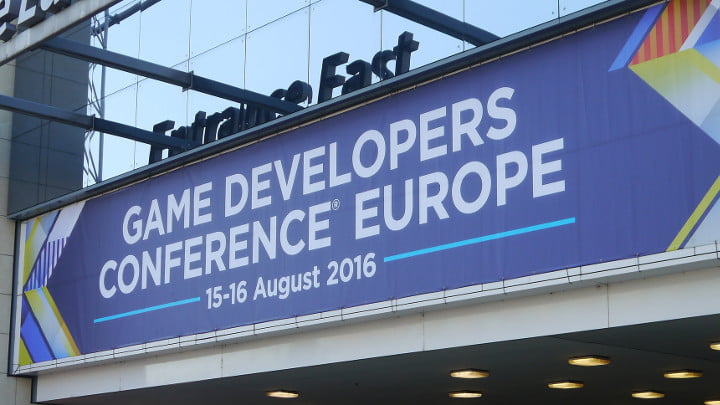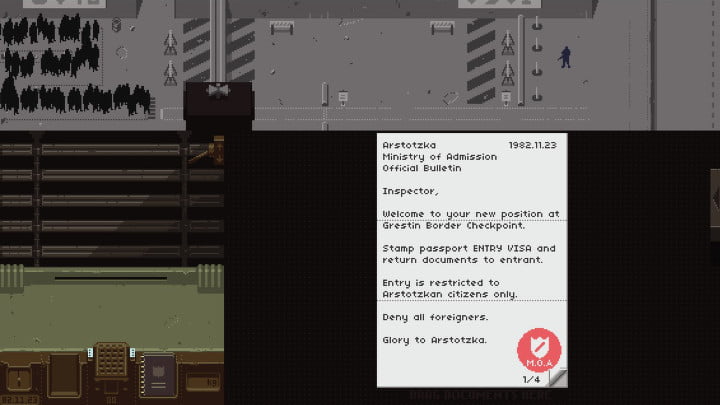Some of the gestures, both large and small, show just how great the games industry can be.
On January 27. 2017, a mere seven days into his presidency this absolute flaming shitshow, President Bannon Trump signed an executive order to protect the nation from foreign terrorist entry into the United States suspend the US Refugee Admissions Programme and impose a travel ban on nationals from (or those with dual-nationalities travelling on the passport of) seven predominantly Muslim countries. The refugee admissions suspension is for 120 days, with an indefinite ban on Syrian refugees, while the travel ban was set to last for 90 days.
Interestingly, other Muslim majority countries – Egypt, Libya, Turkey, Saudi Arabia, Indonesia, all with obvious histories of terrorist events – have not been included in the travel ban. Coincidentally, Donald Trump has business interests in these countries. Anyway, moving on.
Executive orders are not immune to scrutiny, however. Congress has the power to overturn them, for one thing, but in a GOP-majority house that is unlikely. Instead it was the Federal courts, with suits from displaced individuals, the American Civil Liberties Union (ACLU) and even the state of Washington itself – home of tech giants Microsoft and Valve, among others – bringing rulings against the executive order.
President Trump and Bannondorf are of course challenging these rulings and have indicated they may just keep issuing new executive orders to replace the first one, like a bizarre, right-wing version of whack-a-mole. The net result is that travel to (and from – many don’t want to leave for fear they won’t be allowed back in) the United States is in turmoil.

With all that’s going on in the United States and the rest of the world – lest we forget that an un-elected Prime Minister is driving the United Kingdom’s metaphorical bus into a ravine because 52% of the passengers voted to do it, on the basis of a (literal) bus of lies and false promises – the world of video games can seem small and insignificant.
Unfortunately, as much as angry teenage boys would like to keep politics (or equality, morality, or anything else with a modicum of social importance) out of video games, that’s simply never going to happen. Case in point: the 2017 Game Developers Conference, hosted in San Francisco at the end of this month, falls smack in the middle of the 90-day travel ban.
While the ban is currently lifted, that feeling of uncertainty has far from evaporated. The ban itself could be reinstated or replaced at any time, while some of the consequences of it – from residents being talked into surrendering their Green Cards by immigration staff (under the guise of ‘expediting the process’) to the increase of xenophobic behaviour among the public, emboldened by the implicit confirmation of their prejudices by the highest office – will still be felt for some time to come.
So what does the video game industry do about such a dangerous and divisive issue?
The official GDC response
When news of the travel ban broke, the organisers of GDC were quick to realise its implications to their event. Hosted from the Moscone Center, San Francisco, from February 27 to March 3, 2017, this year’s conference falls smack bang in the middle of President Trump’s vortex of uncertainty. The business of game development is a global one, with no borders or barriers to speak of, so it was apparent almost immediately that there would be some delegates who would be unable to attend the event.
The official GDC Twitter account did something classy in response: it offered full refunds to anyone impacted by the travel ban.
GDC is a global community – we're horrified by the #MuslimBan. Of course we'll refund affected attendees, and keep fighting for inclusivity.
— GDC (@Official_GDC) January 29, 2017
Which you might think is the least they could do, but for an event as expensive to attend as GDC, offering full refunds is a big deal. You can see just how much tickets actually cost over on our conference preview article to get an idea of what’s at stake. Then there’s flights and accommodation to consider. San Francisco is literally the other side of the world – longitudinally speaking, Iran is as far as you can get from the city by the bay – so getting there is a long, expensive haul. When you do get there, it’s also a bloody expensive place to stay.
Offering day one, decisive refunds on GDC conference passes – and therefore giving people the opportunity to refund or rearrange flights and accommodation – is vital to ensure that people weren’t out of pocket in addition to the injustices being served against them.
We contacted GDC’s press team to ask how many refunds they had processed, and received the following response:
“There continues to be a quite large number of moving parts and the conference organizers don’t have any concrete numbers yet.”
Which is obviously less than conclusive, but suggests there have been some takers.
Perhaps offering GDC Vault access – to view the video archives of the event’s talks and conferences – to delegates who have had to cancel, either for free or a reduced rate, will be the next step to ensure the vital knowledge transfer component of GDC isn’t lost. GDC is more of a learning experience than a traditional expo, after all.
The unofficial GDC response (from Respawn, Gamescom and Unity)
There has also been talk among the development community about the potential to move next year’s event to a ‘more inclusive’ location. Canada, that bastion of politeness and friendliness, is a name that’s come up a lot on Twitter.
The sad fact is, there was already a GDC conference in a more tolerant and inclusive location: Germany. To be fair to the organisers, GDC Europe was always smaller and more poorly-attended than its American big brother. At the time the decision to cancel GDC Europe 2017 made sense, but it feels like an event we’re crying out for right now.

GDC Europe was traditionally hosted in the days immediately leading up to Gamescom, the giant German expo – like PAX or E3, but with bratwurst and beer – hosted in Cologne every July. In the wake of GDC Europe’s absence, Respawn have pushed back the dates of their Gathering of Games Developers event, typically a fringe event in the run-in to Gamescom, to tie in with the traditional GDC/Gamescom cross-over. This will form a larger Gamescom-sponsored event that will be known collectively as Devcom. It’s not as well-funded or attended as GDC events (and passes obviously won’t be transferable, as they could have been to GDC Europe) but it’s good to see something has stepped into that gap.
Likewise Unity, the game engine favoured by so many indie developers, has taken a firm stance against the travel ban and offered alternatives to the GDC displaced. In an email to staff, Unity CEO John Riccitiello outlined the company’s opposition to the travel ban, and further outlined the company’s commitment to helping to counteract the harm that it has caused. In it, he wrote:
“We are going to invite 50 developers from the list of countries impacted by Trump’s ban to Unite Amsterdam, paid for by Unity. We know that many of our developers would want to travel for events like GDC, E3, Unity’s Vision Conference or Unite in LA – and don’t feel (or aren’t) welcome. We are officially inviting them to join us in Amsterdam. We are going to invite our developers and platform companies to sponsor more beyond the 50 we pay for. If we end up having more sponsored developers than we can accommodate in Amsterdam, we’ll look to take the overflow to other Unite events. The message is clear – Developers, no matter their country or religion, are welcome with Unity.”
In addition, Unity have promised to match any donations made by their employees to associated charities and organisations fighting the ban (like the ACLU) up to a value of $1000 per donation. In closing, he affirmed the company’s commitment to equality and doing their bit to assist in any way they can.
“So, like many of you, I am super challenged by the changing political landscape. I strongly believe that there is no place in this world for discrimination, in any form. We at Unity are going to do our part to address the situation in our own unique way, focused on our community of developers and in helping amplify the voice of our people.”
The really unofficial GDC response (from Devolver Digital)
You might be familiar with Devolver Digital’s unofficial expo antics. If you’re not, then here’s a quick rundown:
Devolver Digital host something of an anti-E3 event. Rather than taking space on E3’s conference floor, paying huge gobs of cash for the privilege and generally getting lost in the noise, they take a different road. In 2013, they set up in the parking lot of a Hooters across the street, along with a good old fashioned tailgate grill and buckets of cold beer, and Airstream trailers in which to demo their games. It was fun, it was different, it had burgers and beer, it was outside (and therefore didn’t smell like… well, E3) so unsurprisingly, it was a massive success. In 2014, they did it again.
By 2015 E3 were getting a little upset at being undercut by the plucky upstart. Devolver Digital by this time had a large white balloon festooned atop their trailer park anti-expo, drawing punters in and building a buzz away from E3’s carefully controlled environs. That year E3 took action, parking containers between their entrance and the Devolver Digital parking lot, to prevent people who didn’t already know to look for it stumbling on it by mistake. Out of sight, out of mind seemed to be the approach.
Devolver Digital weren’t taking that lying down however, and in 2016, they decided they were going to need a bigger boat balloon:
Last year E3's organisers hired crates to block @devolverdigital's unofficial stand from the public. So this year… pic.twitter.com/YCeXknc6im
— Simon Parkin (@SimonParkin) June 14, 2016
Yes, you might see this as all very childish, seeing who can pee highest up the side of the LA Convention Center, but you’ve got to love Devolver Digital’s commitment to doing things their own way and supporting indie development with every fibre of their being. Fast-forward to this February and the offer of refunds to GDC delegates impacted by the travel ban, and Devolver Digital have yet again found another way: they’ve offered to demo games on behalf of anyone who is unable to attend GDC 2017.
We got in contact with Devolver Digital to ask if they’d had any takers, and received the following response from Devolver’s Nigel Lowrie:
“We’ve already had a few game submissions and plan on releasing the names on gdc.devolverdigital.com closer to GDC so everyone knows what will be shown at the event.”
Simply put, there will be games demoed at GDC 2017 – or at least, in their inimitable off-site, anti-expo event – that otherwise wouldn’t have been there without Devolver Digital stepping in. That’s a lovely thing.
The response from developers and publishers
The response from the development community and the big businesses involved in the games industry has been overwhelming and universal condemnation of the travel ban. Just spend a little time on the Twitter pages of some of the most famous names in the industry and you’ll see exactly how they feel about it, regardless of whether the travel ban impacts them or not.
Major development and publishing houses have also expressed their concern at the direction the United States is taking, and the impact the travel ban specifically is having on their workforce. EA, Ubisoft and Bethesda have all come out against the executive order, though it isn’t just limited to games. Major US-based tech employers Apple, Google and Facebook also piling the pressure on President Trump and pouring funds into the legal challenges to protect their staff and ultimately, their businesses. Valve has expressed concerns about not only their workforce’s well-being, but also on the impact these travel restrictions will have on major eSports tournaments like the DOTA 2 International, which has already seen visa issues reducing the field in recent years.
Humble Bundle, the original ‘pay what you can’ charity bundle who regularly raise vast sums of money for good causes, have also stepped into the fray to support the ACLU (and also Medecins sans Frontieres and the International Rescue Committee). Their Humble Freedom Bundle has only been live for a day or so at the time of writing, yet has already sold over 70,000 bundles and raised over $2.3 million (£1.8 million). Included in the bundle are over $600 worth of great stuff, with a number of books and extremely popular games, including:
- The Witness (Dan’s game of 2016)
- Super Meat Boy
- Stardew Valley
- Day of the Tentacle Remastered
- The Stanley Parable
- Human Resource Machine…
Seriously, this thing is huge. Go and check out the full list for your self. There are six days to go on the bundle with more things being added all the time, and as an added incentive – if one were needed – Humble are going to match the first $300k donated. Everything else from this point on is just gravy.
Indie developers are also responding to the travel ban in the best possible way, however, by making donations to the ACLU and other organisations to support the ongoing legal battle against the executive order. Cardboard Computer (Kentucky Route Zero), Vlambeer (Luftrausers) and Ink Stories (1979 Revolution) have all pledged to donate all sales of their games for a fixed period of time. Many of them have matched or bolstered donations out of their own pockets, leading to tens of thousands being raised in a short space of time, and those are just a small subset of the examples we know about.
The real story of the developer donation, though, is fittingly centred around indie immigration ’em up Papers, Please.

Given the game’s theme it’s no real surprise that Papers, Please has been on people’s minds during these uncertain times. When we caught up with developer Lucas Pope to ask about the progress of his fundraising campaign (again through donating sales revenue from his immensely popular game) the irony of his game’s relation to the border control issues in the United States has not been lost on him.
“I made an attempt with Papers, Please to show multiple sides of the border control issue, in a way that people on either side could understand and empathize with those on the other side. My preference would be for this sort of issue to be less and less relevant. Unfortunately that’s not the way things are working out.
One interesting difference between the game and current events is how Arstotzka’s safety-related regulation changes are generally motivated by either direct attacks, or the immediate threat of attack. That structure made sense mechanically and narratively and helped explain the connection between a tight border and the desire for safety. It seems the current US policy is either missing or misapplying this connection.”
So while the concepts in Papers, Please are feeling uncomfortably real and disturbingly prophetic, his fundraising efforts against the travel ban have been a massive success.
“The charity sale made sense considering the topic and relevance of the game. I wanted to do something to help and this seemed like a good way to do it. I chose the American Refugee Committee (refugee support), the National Immigration Law Center (an immigrant-law focused organization), and the ACLU (general constitutional rights) as charities because they deal directly with the topics covered by the game.
In total, the charity sale raised just over $47K. I’m rounding up to $50K and splitting it evenly between the three organizations.”
That’s a whopping total from a small developer, and really shows the power of the development community in all its forms – from one-man development houses like Lucas and scrappy little publishers like Devolver Digital, through to big businesses like GDC and Humble Bundle – to combat some of the evils in the world. After all, games may serve as a powerful distraction, but they can also be a force for change and spreading good in the world.
Hopefully, though, we’ll soon be able to look back on this event from the right side of history and see what an appalling misadventure into xenophobia and scaremongering the US has taken. It really does feel just like Pope envisaged with the design of Papers, Please, a novel game that now feels all too real in the most terrifying way.
“My feeling when making Papers, Please was that heavy-handed border control is a relic of the past and something to look back on critically. I’m only a little surprised that this is where we’ve come to in the US today. Just like in Papers, Please, foreigners make a convenient scapegoat.”
I don’t think there’s anything more to add. Well said, Lucas.
Image sources:
The Telegraph; Official GDC Flickr account; Papers, Please press kit; and the header image is a combination of an image from CNN, the Papers, Please press kit, and our nightmares (sorry to use your logo like that, Lucas!)






